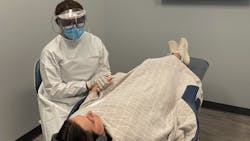The challenges of dental assisting: Meet them with compassion
By Claudia Paye, MAADOM
As dental professionals, we can agree that we face challenges every day. Dental assistants are the primary people patients rely on and ultimately put their trust in. Being a dental assistant requires many personable traits, and learning how to deal with daily challenges will help you survive in your career and earn patients’ respect. Although I could write a book about tips for managing your career, I have found the dental assisting role can be defined in two simple words—be compassionate.
According to Merriam-Webster, compassion is the "sympathetic consciousness of others.” Assistants play many roles, but ultimately, they are the patient’s counselor. As an assistant, you’ll get to know patients better than anyone else in the office. You’re going to hold their hands through a personal and invasive process. You’ll reassure them that they’re in good hands, are receiving the treatment discussed, and will be correctly billed. You’ll assist with several uncomfortable situations for them, ranging from x-rays, injections, and long procedures. Remaining calm, positive, and compassionate will help ease patients’ nerves.
The most compassionate thing you can do for your patients may seem too simple. Hold their hands when they’re receiving anesthetic. After the doctor has finished injecting the anesthetic, offer several rinses and have tissues available if a patient seems overwhelmed. Ask if they would like water, a blanket, or the TV turned to a show they like. These small, caring touches will go a long way compared to the care in an average “in and out” dental facility. Patients like to feel respected, and what better way to show this than to treat them like family?
Let’s look at two of the most frequent patient concerns I hear in the dental office and how we like to respond to them.
1. “Why do I have to get x-rays? Nothing hurts, and I already know what’s wrong.”
We like to approach this type of comment with compassion and state, “I’m happy to hear you aren’t having any pain,” or “I understand you think you know what the issue is.” But let them know that as a medical provider, you’re committed to making a diagnosis based on a factual assessment, and the only way you can correctly diagnosis is by seeing what’s going on inside their mouth.
No one expects their cardiologist to just accept that their heart is fine, or what treatment they need without getting the appropriate diagnostic tests, right? When you tell patients this about dentistry, they get the point. Even if a patient remains apprehensive about having x-rays, keep calm and explain that you want to provide them with the highest quality care and the way to do this is by obtaining the necessary data from reviewing the x-rays.
2. “I just came here for a cleaning, so I just want a normal cleaning.”
Patients usually say this to the hygienists, and a good assistant should be willing and able to help the hygienist with a response. Some offices may have a standard answer regarding cleanings, but if your office bases the type of cleaning on probe readings, you may have to explain to patients, especially new patients, why they’re not eligible for a “normal” prophylactic cleaning. And as always (yes, you guessed it) the best response to anger and denial is to remain calm and compassionate.
Explain to patients that it would be a disservice not to educate them on their current condition and what is medically necessary to restore their oral health. Reassure them that as a dental professional you don’t want to ignore disease in their mouth or dental decay. Remind them that your main objective is to restore their health and well-being, ultimately saving them money and improving their life. Explain that delaying dental procedures may increase the cost of treatment in the future as bacteria multiplies.
Also tell them that untreated problems can become more severe, causing additional issues and cost. Reassure them that you understand their concern, but you want what’s the best for them. It’s difficult for patients to argue with your desire to provide the best care. This sense of caring should come from your understanding that every person has their own issues. Reminding them you’re there to help will allow you and your patients to move forward with a treatment plan that’s filled with understanding, education, and acceptance.
One more piece of advice: always deliver your recommendations and expectations with confidence. Patients easily sense if someone is nervous or unfamiliar with the information. Patients need to be reminded about the office’s standard of care and how they can achieve better oral health. Delivering the necessary information in a compassionate and informed manner will reduce the stress of the unknown and help guarantee success in your dental career. It may take practice in front of your mirror or family, but gaining confidence will make it easy to deal with tough situations with grace and most importantly, true compassion.
Claudia Paye, MAADOM, was awarded the Henry Schein Green Leader award in 2016, and was named one of the top 25 Women in Dentistry in 2017. She’s the recipient of the AADOM Office Manager Distinction award for 2017 and 2019. She’s past president of the New York City AADOM chapter and is now a member of the Northeastern Florida chapter. For more than 20 years she has taken pride in providing amazing service to her patients.
